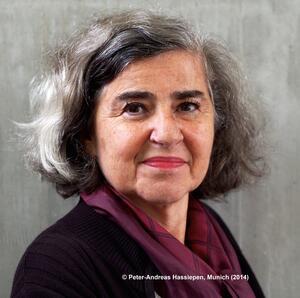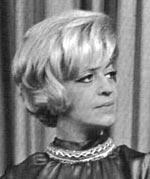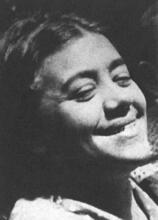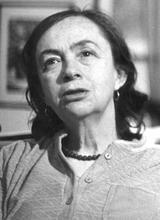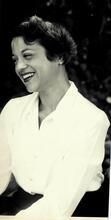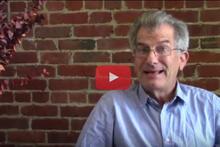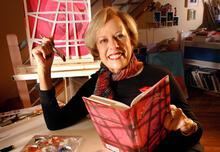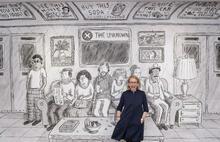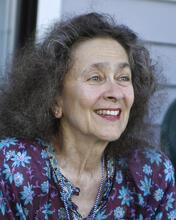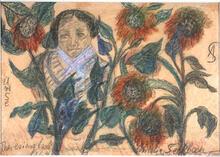Barbara Honigmann
Barbara Honigmann is among the most important German-Jewish writers born after the Shoah. Honigmann firmly places her writing within the tradition of German literature, though she is painfully aware of the anti-semitic strains in German cultural history. In her prose and essays, she sketches portrayals of German Jews as they fled National Socialism to settle as Communists in post-war East Berlin. She also portrays clashes between the religious and cultural traditions of Sephardim and Ashkenazim Strasbourg, France, where she lives in self-imposed exile, and provides powerful insights into her generation of Jews born into the secular societies of Eastern Europe.
Family Background
Barbara Honigmann, born in East Berlin on February 12, 1949, is the most distinguished German-Jewish woman writer of the generations born after the Holocaust. Her father, Georg Honigmann, Ph.D. (1903 in Wiesbaden – 1984 East Berlin), had emigrated to Great Britain in 1933 and later returned to East Germany, where he became a prominent journalist, film producer, and author. Her mother, Alice (née Kohlmann, 1910–1984), was born in Vienna and emigrated to Great Britain in 1934. She worked in film dubbing. The couple divorced in 1954.
Beginnings of her Career
Barbara studied theater at Humboldt University in East Berlin before launching a career as a theater director, painter, and writer. In 1981 she married the scientist Peter Obermann, who later took her surname and became the director of the Heidelberg-based Zentralarchivs zur Erforschung der Geschichte der Juden in Deutschland (Central Archive for Research on the History of Jews in Germany) from 1991 through 2016.
In 1984 – the year her father died and her mother received permission to leave East Germany for her native Vienna - Honigmann moved with her husband and their two children (Johannes, b. 1976, and Ruben, b. 1983) first to Frankfurt am Main and eventually to Strasbourg, France. Here, they found a place of Jewish religious studies that allowed Honigmann to commit to a form of Jewish identity unavailable to her during her upbringing in Communist East Germany. Living abroad in Strasbourg, with its geographically almost negligible distance from Germany, has enabled Honigmann to pen, in the German language, an impressive series of essays, short stories, and novels that all point to key characters, moments, and places in her life, including her newfound home in a synagogue frequented primarily by Sephardi women. She also began working as a painter.
Questioning Jewish Life in Germany
In her subtle prose Honigmann portrays the conundrums of the Jewish experience in Germany by surveying various constellations of Jewish attempts at partaking in German life and letters. Her collection Damals, Dann, Danach (In Those Days, After That, and Later, 1999) outlines many of the motives of her larger oeuvre as it surveys (it turns out, in vain) German Jewish history as well as her own family history for viable ways of living as a Jew in Germany. The experiences of many of Honigmann’s characters resemble those of the author herself: they grapple with the difficulties of living as Jews in Germany—most of them leaving Germany for France, like the author—while remaining rooted in the German language and committed to Germany’s cultural traditions.
Honigmann’s first novel, Eine Liebe aus Nichts (A Love out of Nothing, 1991), describes the young heroine’s displacement from the cultural center of East Germany to Paris and the problems of settling in a cultural and linguistic context that remains foreign to her despite the many attractions it offers for a Jewish life. In Soharas Reise (Sohara’s Journey, 1996) and Chronik meiner Straße (Chronicle of my Street, 2015), Honigmann is even closer to her chosen home when she situates the narrative in Strasbourg’s Orthodox community. In this setting of learning she portrays the clashes between the religious and cultural traditions among the members of the community. Exploring the backgrounds of the Descendants of the Jews who lived in Spain and Portugal before the explusion of 1492; primarily Jews of N. Africa, Italy, the Middle East and the Balkans.Sephardim and Jews of European origin and their descendants, including most of North and South American Jewry.Ashkenazim gathered in the Jewish quarter, Honigmann sheds light on the prosperous yet highly diverse Jewish community of contemporary France. Rendering a loving tableau of a site where immigration both from Africa and from within Europe and a multitude of different faiths, cultures, and languages have profoundly changed France’s old social order, Honigmann uses her own experience as an outsider from which to appreciate and depict the situation of other minorities.
In her essayistic work (Das Gesicht wiederfinden. Über Schreiben, Schriftsteller und Judentum, or Finding One’s Face Again: On Writing, Writers and Judaism; Damals, Dann, Danach), Honigmann provides powerful insights into her generation of Jews born into the secular societies of Eastern Europe and articulates their major points of references in building a Jewish identity beyond the modes of their parents and grand-parents. Intriguingly, her own turn towards the religious traditions of Judaism has not led her to become a religious Jewish writer in any sense of the term. She also reflects on the conundrum of writers who, like herself, are bound to a vernacular and cultural tradition that has been tainted by virulent anti-Semitism.
Honigmann’s perspective also includes a strong awareness of the situation of women both in the world of secular cultural production and in the religious practices of Judaism—a perspective that informs her fiction by focusing on female Jewish characters in their complex relationships to men and her essays by reconsidering the traditions of female Jewish artists.
Selected Works by Barbara Honigmann
Roman von einem Kinde. Darmstadt: Luchterhand, 1986
Eine Liebe aus Nichts. Berlin: Rowohlt 1991.
Soharas Reise. Berlin: Rowohlt, 1996.
Am Sonntag spielt der Rabbi Fußball. Heidelberg: Wunderhorn, 1998.
Alles, alles Liebe. Munich: Hanser, 1999.
Damals, Dann, Danach. Munich: Hanser, 2000.
Ein Kapitel aus meinem Leben. Munich: Hanser, 2004.
Das Gesicht wiederfinden. Über Schreiben, Schriftsteller und Judentum. Essays. Munich: Hanser 2006.
Das überirdische Licht. Rückkehr nach New York. Munich: Hanser, 2008.
Bilder von A. Roman. Munich: Hanser, 2011.
Chronik meiner Straße. Roman. Munich: Hanser 2015.
Georg. Roman. Munich: Hanser 2019.
Selected Honors
2000: Kleist-Preis
2004: Koret Jewish Book Award (New York)
2011: Max Frisch-Preis of the city of Zurich
2015: Ricarda-Huch-Preis
2018: Jakob-Wassermann-Literaturpreis
2023: Goethe Prize
Brandt, Bettina. “Attempts to Read the World. An Interview with Writer Barbara Honigmann.” In Rebirth of a Culture: Jewish Identity and Jewish Writing in Germany and Austria Today, edited by Hillary Hope Herzog et al., 157-170. New York: Berghahn Books, 2008.
Nolden, Thomas. Junge jüdische Literatur. Würzburg: Königshausen & Neumann,1995.
Stern, Guy. “Barbara Honigmann: A Preliminary Assessment.” In Insiders and Outsiders, edited by D. Lorenz and C. Weinberger. Detroit: Wayne State University Press, 1994.

